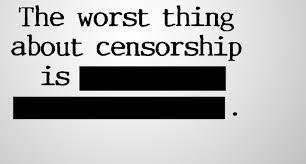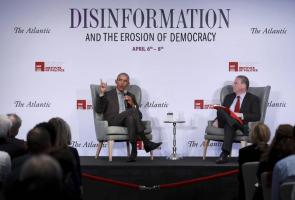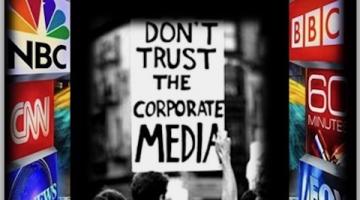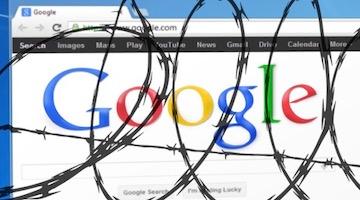Project Censored Host Mickey Huff predicted that #CancelCulture warriors would be calling stations to complain about his opposition to Big Tech censorship, writes Ann Garrison.
“They mostly use these tools against progressive movements, against people's movements, against communities of color and people on the margins.”
This week Polina Vasiliev and I spoke to Mickey Huff, Diablo Valley College history and media studies professor, Director of Project Censored, and host of Pacifica Radio’s Project Censored Show, for Pacifica’s “Covid, Race, and Democracy” about Big Tech censorship, including censorship of dissidence regarding COVID-19. This is a transcript of that conversation.
Ann Garrison: What has been the fate of your Critical Media Literacy Conference of the Americas held last fall and then, as I understand it, disappeared from the YouTube.
Mickey Huff: Indeed, it did. And thanks for having me on to discuss these issues. The Critical Media Literacy Conference of the Americas, the lead organizer for that is Dr. Nolan Higdon, whom I've worked with for years on various things. And Project Censored was a co-sponsor of this event. It was also co-sponsored by several academic institutions, including UCLA, USC, UC Santa Cruz, Stanford, and Cal State across the State of California. So, in other words, as I’ve mentioned in a couple of other interviews, Alan Macleod over at Mint Press News, did a pretty in-depth piece on this. I know you talked about it; I think in a Black Agenda Report piece. This is an ongoing issue. This is an issue of Big Tech gatekeeping, algorithmic censorship.
We have not been able to get any real feedback from YouTube about what happened, except that they, in true Orwellian fashion, flipped the script, and basically tried to say that Nolan didn't upload the videos or that the videos maybe didn't exist in the first place. They were able to find one of the videos, the keynote, and the more irony there is that one of the keynote presenters was scholar Dr. Safiya Noble, who wrote a book a couple of years ago called “Algorithms of Oppression: How Search Engines Reinforce Racism” about YouTube censorship and deplatforming, particularly of BIPOC communities. And we at Project Censored have covered YouTube’s algorithmic censorship of LGBTQI communities. That was actually in our Censored 2020 book. Andy Lee Roth and April Anderson wrote a whole chapter on Stonewall. Then they wrote another piece for Index on Censorship. We've been on this case for a while only to interestingly find ourselves at the receiving end of Big Tech censorship last fall. So there aren't any major updates other than we're still trying to see what happened.
“This is an issue of Big Tech gatekeeping, algorithmic censorship.”
Nolan has a great steering committee of people who are planning the next conference, which will be held next October—the Critical Media Literacy Conference of the Americas—and we'll have information at ProjectCensored.org about that. And we're also talking about it in several places. We're probably bringing it to the media literacy conference in the summer. I've been talking to several people on several shows about it. But the interesting thing is that when contacting YouTube again, they had almost nothing to say about it other than to flip the script and pretend that it didn't happen. I actually had to procure emails that proved that we had screenshots. We had email links of the conference. We had screenshots of other academics sharing it online. We were using this as curriculum in college classrooms on several different campuses.
So for YouTube to pretend that this didn't happen is just absolutely insane, for lack of a more articulate phrase. And then they said, well, we don't know what to do. Can you re-upload the videos? And this isn't about re-uploading anything. Fortunately, we do have the videos. Nolan has the video. He could spend another two days of his life uploading them, but he already did that. And there was no warning of the entire channel being disappeared.
Now let me be clear. This isn't the Project Censored channel at YouTube, right? This is a specific channel that was set up for the Critical Media Literacy Conference of the Americas. It was its inaugural of what's going to be an annual conference. It is a conference that is diverse. It is critical, and it is comprised of more radical academics, particularly those that are calling out Big Tech censorship among other issues. So that this channel was disappeared without warning, without notice, without explanation, without redress, is incredibly notable, because they're going to come after—even algorithmically—a bunch of critical media literacy scholars.
Some of you all know what we do and what we talk about. And it's not necessarily riveting YouTube material per se. It's academic. So this kind of thing’s been happening across the spectrum. And of course, we see that there are strange cheers of glee coming from liberal sectors, whenever people from Donald Trump to Alex Jones are deplatformed.
“They're going to come after—even algorithmically—a bunch of critical media literacy scholars.”
Even Alan Macleod wrote a piece for Mint Press News that was demonetized online. I mean, we all know that, when these tech companies and liberals are crowing for censorship, there might be a few targets on the right that are censored, but they mostly always come after the left. They mostly use these tools against progressive movements, against people's movements, against communities of color and people on the margins. And this time they algorithmically, we assume, came after us. And again, I don't know what else to say about it at this point, because we just don't have more information.
So we're saying, “Well, we don't know what happened in the first place, and it's time-consuming to upload these videos. So we're better off likely just uploading them onto our own platforms.” Of course we could use Vimeo or something else, but that's beside the point, right? I mean, just recently, Greg Palast was talking about Consortium News being censored by YouTube. It's almost every day of the week now that you go and see there's yet another organization, another journalist, another group being de-platformed by these Big Tech companies.
And the bigger question is: “How did these private, for-profit Big Tech businesses get control of the public sphere in the first place?” Right? That's our big concern at Project Censored. In a proprietary way, these companies, unfortunately, do have the legal right to censor or curate content, but that's beside the point overall, given that now these half a dozen or so huge tech monopolies now have control over many of these internet platforms where most people are going not only to get news and information, but also to get their messages out. And we think that's a huge problem that needs to be addressed.
“When these tech companies and liberals are crowing for censorship, there might be a few targets on the right that are censored, but they mostly always come after the left.”
AG: Twitter was the first place I heard that Biden was bombing Syria again, and that's where many people pick up breaking news.
But what I was impressed with in what you said was that Google actually talked to you. I don't know anyone who's had any success contesting a suspension. Even if you haven't had success, they at least talk to you and you have a record of the exchange.
MH: I did not. Nolan had a hard time getting a hold of anybody over at the Alphabet-Google-YouTube conglomerate. Alan Macleod was actually able to get in touch with somebody over there. We don't know who, but it was at least a person. And again, that person basically feigned ignorance.
We've written about a lawsuit against Google, YouTube in particular, because they were deplatforming lesbian and gay channels. And when asked and confronted about it by the people who control these LGBTQ channels, the person at YouTube who spoke with them said we don't censor content that way. But then that person, interestingly, admitted that their algorithms do. So no person was doing it, but someone programmed the algorithms and the algorithms tagged some of these channels, and they were disappeared with little recourse.
And so they were trying to go through a lawsuit and in the findings, hopefully, they were going to come up with this information: who programmed the algorithms. I haven't heard what the update on that legal case is right now. It was supposed to be happening last summer. But I think like most things, COVID may have pushed it to the backburner. I intend to have that attorney back on the Project Censored show, hopefully next month, for an update.
These private, for-profit Big Tech companies all got started with public money. Don't forget that they all get public subsidies, and they've run amok. We need a reckoning here. We need to stop this before it becomes even more commonplace than it already is.
AG: What do you think of the call to deplatform Fox News, which seems to mean getting the cable networks to remove it from what they offer.
MH: I think it's idiotic and misguided. I think censorship is not the answer to these problems. The antidote to speech that we despise or dislike is more speech to counter it. We need to learn how to agree to disagree. We need to learn how to think critically and independently. We need to learn how to keep conversations going, not shut them down. And we need to resist the urge to tribalize our own communications and silo them in social mediated landscapes.
I know that's not popular among some crowds, but if you take a look at the people crowing for censorship, they run the gamut. And it's interesting that you can have Congresswoman Marjorie Taylor Green basically claiming that she's the poster child for censorship, that she's being silenced. Even though if you take a look, and I read a lot of conservative news sites, and they're all concerned about this, but they think it's only a problem of the “liberal” Big Tech companies, censoring them, which is laughable. I counter these people with even more examples of people on the progressive left or further left getting marginalized and getting deplatformed, and they don't want to hear it.
“We need to learn how to keep conversations going, not shut them down.”
This is about Big Tech being able to decide which voices are heard, and nobody appointed Zuckerberg or Dorsey as the czar of information, right? If we have a first amendment and it means anything, it needs to extend from government to how these Big Tech companies are basically run by proxy in the public sphere. And that needs to be challenged. So, no, as much as I may dislike and disagree with certain things that happen at Fox News, I'm not wasting my energy calling to deplatform or censor other voices. I try to spend my energy getting people to learn how to communicate more clearly and effectively together and opposing censorship in its many guises.
AG: Would you say you're a free speech absolutist?
MH: I'm not an absolutist about anything except not being an absolutist. I have nuanced views, and I don't really need to be pigeonholed that way.
There are already laws on the books that restrict certain things. There are limitations to free speech. Even if hate speech is a gray or nebulous area, it is an area. Inciting violence is not protected. Speech victimizing people and calling for acts of violence against people is not acceptable or lawful communication.
So I don't think we need more laws. I think we need more decent people in power who are able to apply these rules and extend them legislatively to the private sector. I do not think that YouTube or Twitter or Instagram, none of these companies, should be allowed to censor on the basis of content. If someone is breaking the law and they are speaking and communicating in a way that violates existing laws, they should be prosecuted. But this isn't something that should be done willy-nilly in backrooms by CEOs and their investors.
AG: All the Big Tech companies have become so married to the national security state that they might as well acknowledge that it's the public sphere.
MH: That's the point. That's exactly the point. And that is where we should focus more of our attention. I do realize that, when I speak this way, it may appear that I'm a free speech absolutist, but I acknowledge fully that there are clear restrictions to things that people should not necessarily be allowed to say. And those are things where people are inciting violence or leading to things that cause people direct harm.
And again, we already have rules for these things. Their application just needs to be extended to these Big Tech systems in place while vigorously defending other forms of legally protected speech. My good colleague, Andy Lee Roth, is writing a piece on the new gatekeepers and the algorithmic gatekeepers. So maybe you'll want to have Andy Lee Roth and Nolan Higdon on a future program.
Polina Vasiliev: Mickey, I’d like to ask about censorship and COVID-19. We're being told that that science rules and that we're supposed to protect scientific consensus, but that changes every week. And when we speak out, let's say about something that is not in agreement with the CDC currently or the WHO, the algorithms do their thing to us. What do you think about that?
MH: I think it's ridiculous. And it's another form of censorship. I see it as quite pernicious and insidious. I know that these are controversial issues. Alan Macleod, again at Mint Press News, just experienced this with a piece that he wrote about Bill Gates. He wrote a piece about Bill Gates and vaccine rollouts and what the profits were behind it, who was benefiting and which groups were being left in the lurch. And that piece was demonetized. So algorithmically, he was targeted that way because he was using key terms, but the algorithms aren't real people and don't bother to read the context of the article. So they don't even understand what he's saying.
You know, similarly, and I know that this isn't popular at Pacifica Radio, but Robert Kennedy's Children's Health Defense is a resource that uses government documents, CDC documents, WHO documents, public health documents, and peer reviewed research that have been published to argue about how we can make medical treatments and vaccines safer. They get called anti-vaxxers and flat earthers, which is a propaganda campaign.
Kennedy himself is not against vaccines. He is for vaccine safety. That there are some people that will glom onto that and make it sound like he's saying something that he isn't is part of the problem of our propaganda system and a lack of critical thinking and discourse. And it's a lack of tolerance to not have these open discussions.
Science isn't a thing, like scientism. It's not something to be worshipped. Scientific methodology is just that. It's a method of constantly questioning, constantly looking at evidence and reforming the way we see the world based on transparently sourced evidence. And we can't do that process if we have people and we have powerful institutions to shut down people that ask legitimate questions.
And I want to be very careful with this because there is a certain way that legitimacy can be established by transparently sourcing the nature of the questions. And I think that we see that among some people in our society. Are there other people that, you know, use this opportunity to wildly speculate and cast aspersions and say things that are not proven? Yes. Is that a problem? Yes, but we have to be very careful about how we get to decide who gets to speak and who doesn't in the public sphere, because often, especially in terms of scientific advancement, it's people who are saying very wildly unpopular things that history proves later to be true or to be right, or to be more accurate than they were given credit for at the time. And I think that's what it means to respect the scientific methodological process.
“We have to be very careful about how we get to decide who gets to speak and who doesn't in the public sphere.”
I'm sure listeners out there are going to be calling the stations, complaining that I'm an anti-vax person or something else, just because I have the temerity to talk about this in an open way. But I think that there are a lot of other people who share this opinion but are just too afraid to talk about it because they get tagged very quickly with negative labels. Part of the problem is that our public discourse lacks critical thought. It lacks critical assessment. And it also lacks compassion for people who have different views and different beliefs. That's a real crisis for us as the human species. And so I would hope that we'd be able to develop a communication system that does allow for reasons and questioning and challenges, but at the same time also acknowledges when there is a consensus around certain topics. One that always leaves the door open for future possibilities.
I was one of the first people to support Mark Crispin Miller's academic freedom case at NYU. Not necessarily because I agree with everything Mark says or thinks, but because academic freedom is deeply connected to freedom of expression, free speech and freedom of the press. When we really get into the weeds and start trying to micromanage the kinds of questions people ask in the classroom, and conflate it with opinions they may have out of the classroom, I think we're on a slippery slope toward a more techno-fascist and totalitarian society.
I use the term techno-fascism purposely because I think that there is a degree, a shaded degree, of that actually happening among these major tech overlords to try to curate discussion and debate, particularly in ways that go against the capitalist system. And anybody who wants to pretend like Big Pharma isn't deeply interconnected to the capitalist system probably needs to be checked out for being disconnected with reality.
So I think that there is room to ask legitimate questions without making blanket statements that all vaccines are bad and all the vaccines are good and so forth. And my experience with these movements has been very nuanced. For example, in California, a vast majority, nine of 10, who opposed State Senate Bill 277 for mandatory vaccination connected to public education were only opposed to the mandatory element because they wanted to confirm with their physicians what was best for their families. And nine of the 10 people who opposed that legislation actually were pro-vaccine and had their children vaccinated with the exception of one or two CDC-scheduled shots that they delayed or postponed because of personal health issues. You don't see that kind of nuanced reporting in the corporate press because they're beholden to Big Pharma interests. And because nuance doesn't sell. It's not sexy.
“Anybody who wants to pretend like Big Pharma isn't deeply interconnected to the capitalist system probably needs to be checked out for being disconnected with reality.”
The news media has done a horrible job of dividing the country by splitting people into factions. And it doesn't need to be that way. And I think that education can go a long way to change people's minds. And I don't mean propaganda, I mean further exposing people to transparently sourced facts as evidence for certain positions. And I think it's also important to remember that we should be very careful about demonizing other people's intentions. Most people really do have good intentions or are well-intentioned about the things that they're putting forward. And if we close down avenues of communication, we don't really get an even or fair opportunity to change each others' minds. And we don't get an opportunity to think more critically about ourselves and our own positions in the world. Again, I know people reading and listening to this may turn this around and claim any number of things that they think about me, but I would challenge them to invite me to a public conversation about it, to find out what I actually think about it so that they don't twist and turn it into something for their own agendas.
AG: Okay, listeners and readers: Don’t cancel Mickey Huff.
MH: Thanks for that.
AG: Thank you for speaking to “Covid, Race, and Democracy.”
MH: Thank you for having me.
Ann Garrison is an independent journalist based in the San Francisco Bay Area. In 2014, she received the Victoire Ingabire Umuhoza Democracy and Peace Prize for promoting peace through her reporting on conflict in the African Great Lakes Region. Please help support her work on Patreon. She can be reached on Twitter @AnnGarrison and at ann(at)anngarrison(dot)com.
COMMENTS?
Please join the conversation on Black Agenda Report's Facebook page at http://facebook.com/blackagendareport
Or, you can comme nt by emailing us at comments@blackagendareport.com
















